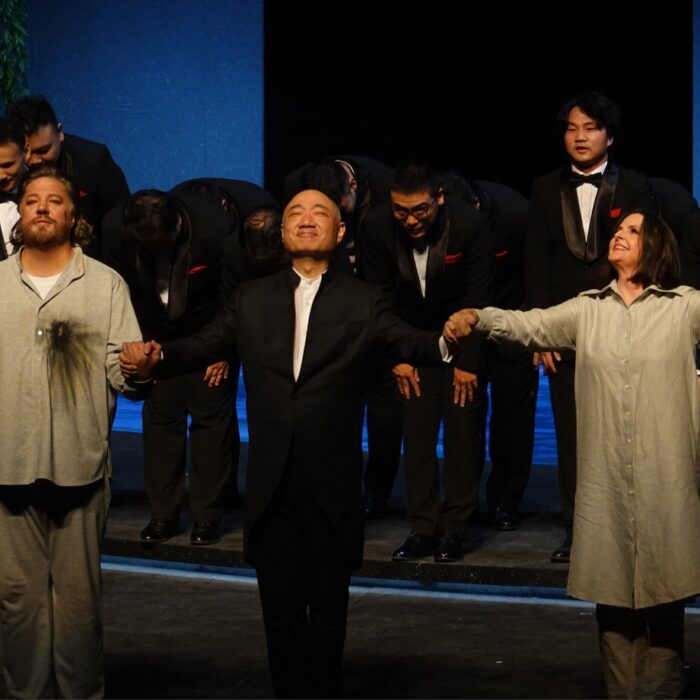
Criticism on Fridays: Opera As a Part Of Political Strategy?
Kristian Benedikt’s Controversial Performance in Minsk Criticized By the State May Play Into the Tenor’s Political Career
By Polina LyapustinaJust before the New Year celebration, the Lithuanian capital was seething with indignation and anger : one of the most famous Lithuanian singers in the world, Kristian Benedikt, had participated in the Christmas concert at the Bolshoi Theatre in Minsk.
It was not the most understandable and logical decision on the part of the Lithuanian tenor, especially at a time when the entire country has been living for almost a year under the pressure of the war raging nearby after supporting Ukraine.
At the end of February last year, the country that lived under Soviet occupation for over 40 years woke up in its worst nightmare. 2022 did fundamentally change the mindset of many (especially liberal) Lithuanians and made the bloody invasion of Ukraine almost a personal war. It was Lithuanian people who crowdfunded the Bayraktar drone for Ukraine last summer.
And so, the news of the beloved tenor who used to represent the country on such stages as the Met suddenly appearing on the main operatic stage of the country that supports Putin’s aggression against Ukraine was met with certain criticism from the government and operatic management.
The Culture Minister, Simonas Kairys said, “I am shocked, to put it simply. Indeed, such choices are incomprehensible to my common sense. The question is, in principle, what is going on in a person’s mind to make such choices? Never in my wildest dreams would I have imagined that such well-known personalities would travel to Minsk to perform.”
Jonas Sakalauskas, General Director of Lithuania Opera and Ballet Theatre added, “As long as I am director, Benedikt will not sing here…This act is a betrayal of Lithuania.”
The singer immediately apologized for his decision, giving a detailed explanation of his behavior.
He declared, “I performed at a concert organized and directed by Oksana Volkova, my stage partner, a mezzo-soprano who has performed several times with the Kaunas Symphony Orchestra.”
He added, “My motive was to pay a pre-Christmas visit and to say with that visit that you are my friends, even if there’s the Lukashenko regime, even if there’s a risk I will be provoked if I go.”
Benedikt also added, that some of his friend’s pastors were imprisoned in Belarus and their church buildings were seized. “Why would I disown them? Why would I turn my back on them? Belarus is full of people just like us who want freedom.”
At this point, the situation could probably calm down, but the usually cold-minded Lithuanian government took it very seriously. But soon, after the minister’s high-profile remarks, an opposition quickly formed not only in publicity but even in Lithuanian Parlament.
Parlament member, Aidas Gedvilas said:
“…What strikes me most about this story is that everyone is happy to judge, to stir the pot, and even to seek to forgive a man who, until now, has been making Lithuania’s name known around the world. To me, this is akin to psychological persecution, if not more. After all, our Constitution says that a person cannot be persecuted for his or her beliefs. Maybe we should separate culture and sport from politics? Or maybe we should strip those who go to Belarus to fill up with cheap fuel of their citizenship…?”
And suddenly, the righteous (and very loud) anger turned out to be not so popular and overpowering. The Minister was accused of being “deaf” and rejecting, the National Theater was reminded of all the tenor’s many contradictions and non-acceptances in the past.
Meanwhile, Kristian Benedikt got plenty of screen time on the central TV channel, to tell his story over again with more details concerning his commitment to the church, traditional values, family, friends, and the arts. And, I have to note, amidst the host’s almost hysterical attempts to get him to admit guilt, at times referring to the concerts in the concentration camps, the tenor’s reasoning and answers looked only more credible.
The interview was copied and quoted (in three languages — Lithuanian, Russian, and English) in every major Lithuanian media and collected loads of feedback from both sides.
And when such controversy appeared, it was just the right time to catch the political intent in it. For all the loud statements about its progressiveness and liberalism, Lithuania in many respects remains a country with a Soviet past, and everyone who has visited such areas of the capital as Naujininkai knows it. The ambiguous attitude of people challenging the minister’s clear and highly moral (in its origins) statement makes a huge room for the opposition. And the excessive emotionality of the official statements made the position of “good guys” only weaker.
And here, was just the right moment to remind people, that the falsely-accused-and-maybe-even-highly-moral-in-his-deeds singer, is now topping the list of candidates of officially centrist, but actually rather right-wing Union of the People and Justice (UPJ) at the municipal election. (Just to clarify, the winners of this election form Vilnius city municipal council, and none of them will be a Mayor of the Lithuanian capital).
The leader of UPJ (which was never successfully elected in Vilnius Municipality before), Petras Gražulis noted, “I thank [Kristian Benedikt] first of all for deciding to become the leader of the list. This man is a man of values, he is a pastor, a soloist, a famous singer, and a respected man. Only these so-called Lithuanian judges do not like him. I think that he is in line with all the values of our party.”
And here we go, all this noise following one simple Verdi aria, sung in Minsk, has begun to make quite a bit of sense. It’s not that much about Kristian Benedikt obtaining (or not) his new political career. It’s more about how opera, in this case, again became a mirror that clearly shows how easily a country under enormous emotional pressure could be divided (and therefore get weaker) over a simple ideological argument.


